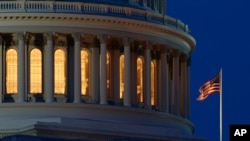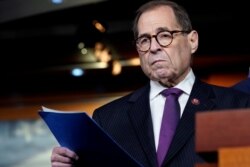The House Judiciary Committee has invited President Donald Trump to attend its first impeachment hearing next week.
The Intelligence Committee wrapped up its role in the inquiry last week and will send its report to the Judiciary Committee, which holds its first hearing Dec. 4.
The Judiciary Committee hearing will look into what it calls the "Constitutional Grounds for Presidential Impeachment."
The rules say Trump and his lawyers would be given the chance to question the panel of still-to-be-named legal experts who will appear as witnesses.
Judiciary Committee Chairman Jerrold Nadler sent a letter to the White House inviting Trump to attend, calling it "not a right, but a privilege or a courtesy."
"The president has a choice he can make: he can take this opportunity to be represented in the impeachment hearings, or he can stop complaining about the process," Nadler said in a separate statement. "I hope that he chooses to participate in the inquiry, directly or through counsel as other presidents have done before him."
Nadler assured Trump that he "remains committed to ensuring a fair and informative process."
Nadler is giving the White House until Sunday night to respond.
U.S. Ambassador to the E.U. Gordon Sondland testified last week that a number of senior Trump administration officials were "in the loop" in Trump's efforts to pressure Ukraine into investigating Democratic presidential rival Joe Biden.
They include Secretary of State Mike Pompeo, Energy Secretary Rick Perry, acting Chief of Staff Mick Mulvaney and former National Security Adviser John Bolton.
They have balked at testifying. A federal judge ruled Monday that Trump does not have the power to stop former White House counsel Don McGahn from complying with a subpoena to appear before the House committees.
Trump, who insists he did nothing wrong, tweeted Tuesday that he "would love to have Mike Pompeo, Rick Perry, Mick Mulvaney and many others to testify about the phony impeachment hoax," calling it a "Democratic scam that is going nowhere."
But it is unclear what Trump means when he said testify "about" impeachment.
Phone call with Zelenskiy
The Democrat-led impeachment inquiry is looking into whether Trump withheld nearly $400 million in badly needed military aid to Ukraine in exchange for President Volodymyr Zelenskiy's public commitment to investigate Biden and also alleged Ukrainian interference in the 2016 presidential election.
An intelligence community whistleblower's concern about Trump's July phone call with Zelenskiy, in which Trump asked him for a "favor," led to the hearings.
Weeks of public and closed-door testimony from a number of witnesses seems to have strengthened the Democrats' case.
Trump's Republican defenders say no matter what the president did, it does not rise to the level of impeachment.
Trump alleges that when Biden was vice president, he threatened to withhold loan guarantees to Ukraine unless Kyiv fired a prosecutor investigating the Burisma gas company, on whose board Biden's son, Hunter Biden, sat.
No evidence of wrongdoing by the Bidens has ever surfaced. Charges of Ukrainian election interference are based on a debunked conspiracy theory that originated in Russia.








